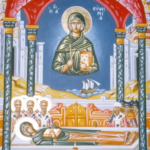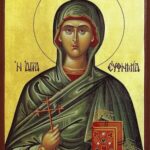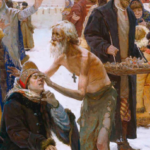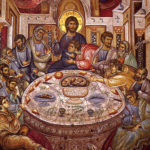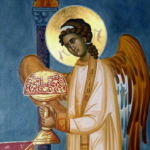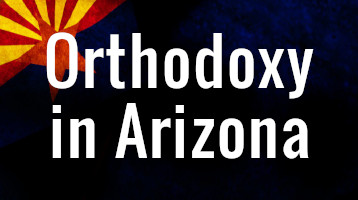The Fourth Ecumenical Synod of 451 took place in the Church of Saint Euphemia in Chalcedon, where her sacred relics were kept. The Patriarch of Constantinople at this Synod was Anatolios, while the Pope of Rome was Leo the Great. Information about the miracle of Saint Euphemia comes from two letters: one from the the Synod to Pope Leo and the other from Patriarch Anatolios to Pope Leo. Though the passages are a bit obscure about the miracle, it says that the definition of faith was delivered by Saint Euphemia as her own confession of faith and confirmed by the holy Fathers present. It seems clear that Pope Leo already knew of the miracle, or it was common knowledge by the time these two … [Read more...]
The Miracle of St. Euphemia the All-Praised at the 4th Ecumenical Council
The holy Great Martyr Euphemia (September 16) suffered martyrdom in the city of Chalcedon in the year 304, during the time of the persecution against Christians by the emperor Diocletian (284-305). One and a half centuries later, at a time when the Christian Church had become victorious within the Roman Empire, God deigned that Euphemia the All-Praised should again be a witness and confessor of the purity of the Orthodox teaching. In the year 451 in the city of Chalcedon, in the very church where the glorified relics of the holy Great Martyr Euphemia rested, the sessions of the Fourth Ecumenical Council (July 16) took place. The Council was convened for determining the precise dogmatic … [Read more...]
“Constitution Does Not Confer Right to Abortion”: Supreme Court Overturns Roe v. Wade
The Supreme Court has overturned Roe v. Wade, with a 6-3 majority ruling in the Dobbs case that “The Constitution does not confer a right to abortion.” “We hold that Roe and Casey must be overruled. The Constitution does not prohibit the citizens of each State from regulating or prohibiting abortion. Roe and Casey arrogated that authority. We now overrule those decisions and return that authority to the people and their elected representatives,” Justice Samuel Alito wrote for the majority. “The Constitution makes no reference to abortion, and no such right is implicitly protected by any constitutional provision, including the one on which the defenders of Roe and Casey now chiefly … [Read more...]
Trampling Down the Power of the Devil!
by St. John Chrysostom Original translation by Dr. David Ford "He who is wrestling is still held fast in the contest; but it’s enough for him that he has not fallen. The brilliant victory will not be completely gained until we depart to the next life. Consider, for instance, the case of some evil lust. The wondrous thing would be not just to refuse to entertain it, but to quench it completely. But if this isn’t possible, even if we have to wrestle against it continually, if we depart in the midst of fighting that ongoing battle we will be victorious. This is different from wrestling matches in the arena, where if you don’t throw over your opponent, you don’t gain the victory. But in the … [Read more...]
Why Didn’t the Holy Spirit Come Right After the Ascension?
by St. John Chrysostom But why did the Holy Spirit come to them, not while Christ was present, nor even immediately after his departure, but, whereas Christ ascended on the fortieth day, the Spirit descended “when the day of Pentecost,” that is, the fiftieth, “was fully come?”(Acts 2:1) And how was it, if the Spirit had not yet come, that He said, “Receive ye the Holy Spirit?” (John 20:22) In order to render them capable and meet for the reception of Him. For if Daniel fainted at the sight of an Angel (Dan. 8:17), much more would these when about to receive so great a grace. Either this then is to be said, or else that Christ spoke of what was to come, as if it came already; … [Read more...]
Is God a Fool?
by Fr. Stephen Freeman Few things are as awkward (and even painful) as “feeling like a fool,” whether it is the mild thing we call “embarrassment,” or the stronger things that make us want to disappear or run away. No one wants to be the fool. Nevertheless, I have come to see God as a “fool,” and those rare saints whom we name the “holy fools,” to be amazing exemplars of this way of being. I do not mean to scandalize anyone by saying that I’ve come to see God as a fool. I mean, rather, to suggest that we seem to constantly ignore His abiding foolishness and, as a consequence, fail to understand His love. St. Isaac of Syria wrote about God’s “manikos eros” (literally, “crazy desire”) for … [Read more...]
Fifty Days of Sundays
by Fr. Patrick Henry Reardon When, at the Council of Nicaea, the Church formally determined that Pascha should always be observed on a Sunday, that determination necessarily affected the final day of Pentecost. Thus, beginning and ending on a Sunday, the whole fifty days of Pentecost began to take on some of characteristics associated with Sunday, the day of the Lord’s Resurrection. This adjustment involved two disciplines in particular: the fast days and the posture of prayer. First, because the entire fifty days of the Paschal season was a celebration of the Lord’s Resurrection, Christians began to observe that interval as a non-fasting period. That is to say, from the fourth century … [Read more...]
It’s Time to Abuse the Devil
by St. Innocent of Kherson Translation by Jesse Dominick By the grace of God we have, brethren, finished another Holy Lent. Much has been acquired by those who spent it as they ought, but likewise, it’s no small loss for those who didn’t spend it as they ought. The Church doesn’t force anyone to fulfill the statutes, but those who don’t, punish themselves. When those who have labored well in fasting now enter into the joy of their Lord, the weak and disobedient sons of the Church must necessarily feel some deprivation and sorrow. It’s good if God allows them to live again until another Lent to correct the present omission (although it’s no longer possible to fully get back what was lost); … [Read more...]
On the Mystical Supper
by Archpriest G. C. Debolsky On the day of the feast of unleavened bread, when according to the Law of the Old Testament a lamb was to be slaughtered and eaten, the hour was come that the Savior should depart out of this world unto the Father (cf. Jn. 13:1). Having come to fulfill the law, Jesus Christ sent His disciples, Peter and John, to Jerusalem to prepare the Passover, which, as the shadow of the law, He wanted to exchange it with the New Pascha—His own Body and Blood. When evening had come, the Lord came with His twelve disciples to a large, prepared upper room of a man who lived in Jerusalem (cf. Mk. 14:12–17) and reclined there. Telling them that the Kingdom of God, which is not … [Read more...]
What is Eucharist? From 106 AD
by St. Ignatius of Antioch “Take note of those who hold heterodox opinions on the grace of Jesus Christ which has come to us, and see how contrary their opinions are to the mind of God….They abstain from the Eucharist and from prayer because they do not confess that the Eucharist is the flesh of our Savior Jesus Christ, flesh which suffered for our sins and which that Father, in his goodness, raised up again. They who deny the gift of God are perishing in their disputes.” Letter to the Smyrnaeans … [Read more...]
- « Previous Page
- 1
- …
- 3
- 4
- 5
- 6
- 7
- …
- 10
- Next Page »
